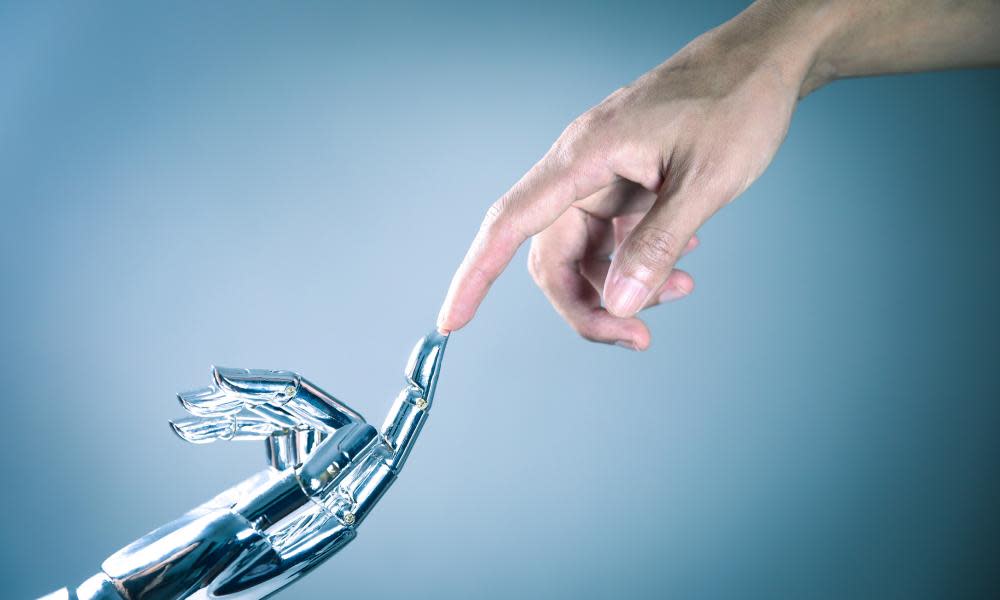Jobs of the future: are you ready to join in?

We are in the middle of a fourth industrial revolution. The first saw the world move from rural societies to industrial urban centres; the second introduced mass production; and the third brought the digital revolution. The fourth is changing how we integrate technology into our lives, thanks to advances such as artificial intelligence (AI), nanotechnology and robotics. But what will this mean for humans as workers?
Retraining will be an essential feature of the new employment landscape, in which many jobs will be automated. Opportunities to reskill should be offered across the whole economy and supported by tax relief to ensure the UK is prepared for the changes ahead, a recent Social Market Foundation report suggested.
Postgraduate study is already a popular option for those looking to move their career in a new direction. Jean-Marc Frangos, a managing director based in Silicon Valley at BT, one of the UK’s largest technology employers, has observed that a growing number of people working in tech retrained after studying for unrelated first degrees.
“When I meet people here, their original education might be anything from ancient Greek to marketing,” he says. “Now they work in the tech domain and they’re very good. Don’t assume that your original education is excluding you from a tech career.”
There are a wide variety of tech careers available for people to pursue after further study, he continues, but certain areas will be in greater demand – particularly data science analytics and cybersecurity, both of which are offered at master’s level at universities across the country. A recent report from jobs site Indeed named data scientists and cybersecurity experts among the most “future-proof” careers.
Don’t assume that your original education is excluding you from a tech career
Jean-Marc Frangos, BT
AI, too, is a huge growth industry: a report from jobs site Indeed found that employer demand for AI-related roles has more than doubled in the US in the past three years, while the number of jobseekers looking for those roles has remained roughly the same. In 2017, the UK government recommended creating an industry-funded AI master’s programme.
Caroline Jay is a senior lecturer in the school of computer science at the University of Manchester and teaches on the AI: Robot overlord, replacement or colleague? module. The course is available to students from all disciplines, she explains, and teaches the theory underpinning AI, as well as practical experience of programming.
“We’re seeing more students from the sciences and social sciences, and even some from humanities,” she says. “They’re not trained in computer science as a first degree, but they do start to do bits of programming and coding along the way and realise it gives them a huge advantage over people who can’t.”
Even if students don’t end up working in AI, she says, the skills they develop on the course will be invaluable in an increasingly tech-driven jobs market.
“We’ve changed the way we think about technology,” she says. “If you have people who are experts in accounting or law or medicine or fashion design and they understand how technology could help them with that, they can be the ones to drive it forward. They might not be writing the programmes, but they will be leading the problem-solving aspect of it. They can make those informed decisions that people in the professions are going to need in the future.”
Nicola Webb is studying for an MSc in data science and computational intelligence at Coventry University, and is hoping to go on to research social robotics – which looks at advances such as using robots to take care of the elderly. She says the potential for development in this area is vast.
“We often debate whether we should be developing AI to such an intelligent level,” she says. “But I think that this generation of computer and data scientists are more than aware of the dangers, through their own research, or from sci-fi movies like Ex Machina, that put such scenarios into play. There is so much that AI can do for us in the future, and we shouldn’t be scared to develop it.”
She recommends anyone considering postgraduate study in the field to “brush up on mathematics, especially linear algebra and matrices”, as there is “much more maths involved than you think”.
Frangos agrees, stating that “excellent technical credentials” will always be necessary, but that the right mindset is by far the most valuable skill to develop.
“Have a proactive attitude,” he says. “It might look complicated because it looks scientific, but there’s a lot of democratisation taking place. There’s a lot of fluidity in this new tech world. It’s not an exclusive world, and it’s particularly welcoming to people who have curious and open minds.”

 Yahoo News
Yahoo News 
